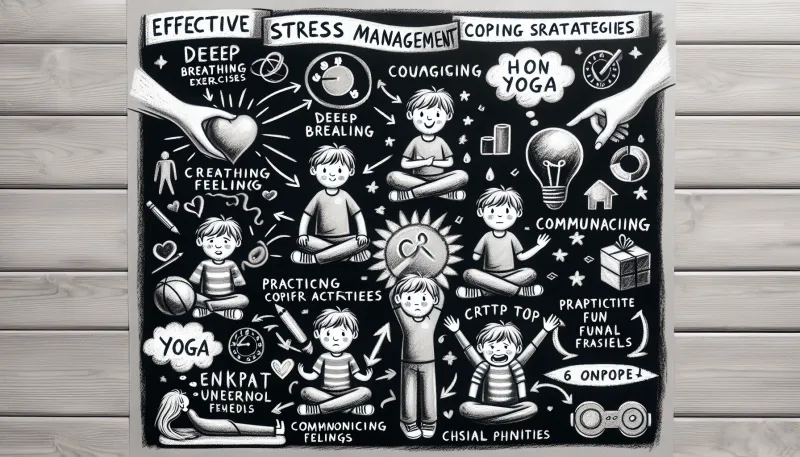Effective Stress Management for Children: Proven Strategies and Tips

Discover effective stress management strategies for children. Learn proven tips to help your child cope with stress and maintain emotional well-being.
Stress is not just an adult issue; children are increasingly facing stress from academic pressures, social challenges, and various other factors. It is crucial to help children manage their stress effectively to ensure their emotional well-being and overall health. This article explores proven strategies and tips for effective stress management for children, providing valuable insights for parents, educators, and caregivers.
Understanding Stress in Children
Stress in children can manifest in several ways, including behavioral changes, physical symptoms, and emotional fluctuations. Recognizing the signs of stress in children is the first step in addressing the issue effectively.
Common Causes of Stress in Children
- Academic pressure: High expectations and a heavy workload can lead to stress.
- Social issues: Bullying, peer pressure, and changes in friendship dynamics can be significant stressors.
- Family issues: Conflict at home, parental separation, or relocation can disrupt a child's sense of security.
- Extracurricular activities: Over-scheduling and high demands in sports or other activities can overwhelm a child.
Signs and Symptoms of Stress in Children
Understanding the signs and symptoms of stress can help in identifying and addressing it promptly. Look out for the following indicators:
Behavioral Changes
- Increased irritability or mood swings
- Withdrawal from friends and family
- Difficulty concentrating
- Changes in sleep patterns or nightmares
Physical Symptoms
- Headaches or stomach aches
- Frequent illness
- Changes in appetite
- Unexplained aches and pains
Emotional Fluctuations
- Increased anxiety or worry
- Feelings of sadness or hopelessness
- Low self-esteem or excessive self-criticism
Proven Strategies for Stress Management
Helping children develop effective stress management skills can significantly impact their ability to handle stress. Here are several strategies and tips:
1. Encourage Open Communication
Creating an environment where children feel safe to express their feelings is fundamental. Encourage your child to talk about their day, their worries, and their joys. Active listening and empathetic responses can help children feel understood and supported.
2. Promote Physical Activity
Regular physical activity is a powerful stress reliever. Encourage your child to engage in sports, dance, or even simple playtime activities like running or cycling. Physical exercise not only helps reduce stress but also improves overall health and mood.
3. Teach Relaxation Techniques
Relaxation techniques such as deep breathing, mindfulness, and yoga can be very effective in managing stress. Practicing these techniques regularly can help children develop a toolkit of skills they can use whenever they feel stressed.
4. Ensure Adequate Rest and Nutrition
A healthy diet and sufficient sleep are crucial for managing stress. Ensure your child follows a balanced diet rich in fruits, vegetables, and proteins. Establish a consistent bedtime routine to promote good sleep hygiene.
5. Foster a Supportive Environment
Create a nurturing and supportive home environment. Encourage positive social interactions and provide plenty of opportunities for play and relaxation. Building strong family bonds and friendships can act as a buffer against stress.
Additional Tips for Parents and Caregivers
Monitor Screen Time
Excessive screen time can contribute to stress and anxiety. Set reasonable limits on the use of electronic devices and encourage other leisure activities that promote relaxation and creativity.
Model Healthy Stress Management
Children often learn by observing adults. Demonstrate healthy stress management techniques in your own life. Show them how to deal with challenges calmly and constructively.
Seek Professional Help if Necessary
If your child’s stress seems overwhelming or persistent, it might be beneficial to seek help from a mental health professional. Therapists and counselors can provide specialized support and teach coping strategies tailored to your child's needs.
Conclusion
Helping children manage stress is an ongoing process that requires patience, understanding, and proactive strategies. By recognizing the signs of stress, promoting healthy habits, and fostering a supportive environment, parents and caregivers can significantly improve their children's ability to cope with stress. Implementing these methods can empower children to achieve emotional well-being and resilience.



























